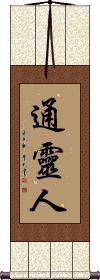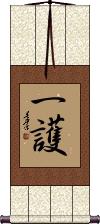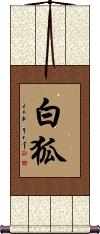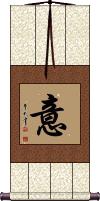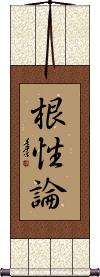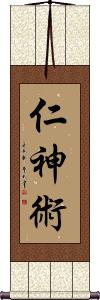Many custom options...
And formats...

Powers in Chinese / Japanese...
Buy a Powers calligraphy wall scroll here!
Personalize your custom “Powers” project by clicking the button next to your favorite “Powers” title below...
Psychic
Ichigo
Japanese animation character
Arctic Fox
Idea / Thought / Meaning
意 is the Chinese, Japanese Kanji, and old Korean Hanja for an idea, intention, meaning, thought, wish, desire, intention, feelings, and thoughts.
In Buddhism, this is the last of the six means of perception (the others are sight, hearing, smell, taste, and touch, and this one represents the mind). It does not literally mean “mind,” but rather something more like mental powers, intellect, intelligence, faculty of thought, or understanding in the Buddhist context.
Sun Wukong / Son Goku
Monkey King
孫悟空 is the name Sun Wukong, also known as the Monkey King. He is the main character with supernatural powers in the ancient Chinese novel Journey to the West.
This title is also known as the real name of the Monkey King in Japanese. This can also be the Son Goku, better known as simply Goku, a fictional character of the Dragon Ball Japanese manga series.
The Guts Theory
The belief that where there's a will, there's a way.
根性論 is a Japanese title that refers to the belief that where there's a will, there's a way.
Another way to translate this is “The Guts Theory” or “The Doctrine of Will-Power.” Maybe breaking down the meaning of the characters will help clarify this:
根性 = will-power; guts; temper; nature; spirit; nature and character; the nature of the powers of any sense.
論 = theory; doctrine; treatises on dogma, philosophy, discipline, etc.
Jin Shin Jyutsu
仁神術 is Jin Shin Jyutsu or Jin Shin Jutsu.
This is a practice of calming the mind and clearing the flow of Qi energy in the body. Jin Shin Jyutsu has some commonality with the practice of Reiki.
A good translation of 仁神術 would be “Benevolent Spirit Method.”
We can break that down into all of the possible meanings:
仁 = benevolence (esp. as a virtue of Confucianism), consideration, compassion, humanity, charity, kindness, or virtue.
神 = deity, soul, spirit, mysterious, psyche, god, divinity, spiritual powers, deva, divine, spiritual, or supernatural.
術 = way, method, means, art, trick, or plan. The correct romaji for this 術 Kanji should be “jutsu.” However, in martial arts, this is often written “jitsu” but in this case, “jyutsu” became common.
Not the results for Powers that you were looking for?
Below are some entries from our dictionary that may match your Powers search...
| Characters If shown, 2nd row is Simp. Chinese |
Pronunciation Romanization |
Simple Dictionary Definition |
力 see styles |
lì li4 li ryoku りょく |
More info & calligraphy: Power / Strength(suffix) strength; power; proficiency; ability; (given name) Riki bala; power, strength, of which there are several categories: 二力 power of choice and of practice; 三力 the power of Buddha; of meditation (samādhi) and of practice. 五力 pañcabala, the five powers of faith, zeal, memory (or remembering), meditation, and wisdom. 六力 A child's power is in crying; a woman's in resentment; a king's in domineering; an arhat's in zeal (or progress); a Buddha's in mercy; and a bhikṣu's in endurance (of despite) . 十力 q.v. The ten powers of Buddhas and bodhisattvas. |
意 see styles |
yì yi4 i i い |
More info & calligraphy: Idea / Thought / Meaning(1) feelings; thoughts; (2) meaning; (personal name) Kokoro Manas, the sixth of the ṣaḍāyatanas or six means of perception, i.e. sight, hearing, smell, taste, touch, and mind. Manas means "mind (in its widest sense as applied to all the mental powers), intellect, intelligence, understanding, perception, sense, conscience, will". M.W. It is "the intellectual function of consciousness", Keith. In Chinese it connotes thought, idea, intention, meaning, will; but in Buddhist terminology its distinctive meaning is mind, or the faculty of thought. |
神 see styles |
shén shen2 shen shin; jin しん; じん |
More info & calligraphy: Spirit / Spiritual Essence(1) spirit; psyche; (2) (See 神・かみ・1) god; deity; divinity; kami; (female given name) Miwa Inscrutable spiritual powers, or power; a spirit; a deva, god, or divinity; the human spirit; divine, spiritual, supernatural. |
夜叉 see styles |
yè chā ye4 cha1 yeh ch`a yeh cha yasha やしゃ |
More info & calligraphy: Yakshayaksha (Buddhist guardian deities sometimes depicted as demonic warriors) (san: yaksa); (given name) Yasha 乞叉; 藥叉; 閱叉 yakṣa, (1) demons in the earth, or in the air, or in the lower heavens; they are malignant, and violent, and devourers (of human flesh). (2) The 八大將, the eight attendants of Kuvera, or Vaiśravaṇa, the god of wealth; those on earth bestow wealth, those in the empyrean houses and carriages, those in the lower heavens guard the moat and gates of the heavenly city. There is another set of sixteen. The names of all are given in 陀羅尼集經 3. See also 羅 for rakṣa and 吉 for kṛtya. yakṣa-kṛtya are credited with the powers of both yakṣa and kṛtya. |
悟空 see styles |
wù kōng wu4 kong1 wu k`ung wu kung gokuu / goku ごくう |
More info & calligraphy: Wukong / Goku(surname, given name) Gokuu |
海德 see styles |
hǎi dé hai3 de2 hai te kaitoku |
More info & calligraphy: HyderThe eight virtues, or powers of the ocean, i.e. vastness, tidal regularity, throwing out of the dead, containing the seven kinds of pearls, absorption of all rivers, of all rain without increase, holding the most mighty fish, universal unvarying saltness. |
猴王 see styles |
hóu wáng hou2 wang2 hou wang |
More info & calligraphy: Monkey King |
白狐 see styles |
bái hú bai2 hu2 pai hu shirogitsune; byakko しろぎつね; びゃっこ |
More info & calligraphy: Arctic Fox(1) old, white fox (trad. said to have supernatural powers); (2) (See ホッキョクギツネ) Arctic fox (Vulpes lagopus); (place-name) Byakko |
禪悅 禅悦 see styles |
chán yuè chan2 yue4 ch`an yüeh chan yüeh zenetsu |
More info & calligraphy: Inner Bliss and Peace from Meditation |
孫悟空 孙悟空 see styles |
sūn wù kōng sun1 wu4 kong1 sun wu k`ung sun wu kung songokuu / songoku そんごくう |
More info & calligraphy: Sun Wukong / Son Goku(1) (char) Sun Wukong (character in the classic Chinese novel Journey to the West); Monkey King; (2) (char) Son Goku (Dragon Ball); (ch) Sun Wukong (character in the classic Chinese novel Journey to the West); Monkey King; (ch) Son Goku (Dragon Ball) |
主 see styles |
zhǔ zhu3 chu nushi ぬし |
owner; master; host; individual or party concerned; God; Lord; main; to indicate or signify; trump card (in card games) (1) head (of a household, etc.); leader; master; (2) owner; proprietor; proprietress; (3) subject (of a rumour, etc.); doer (of a deed); (4) guardian spirit (e.g. long-resident beast, usu. with mystical powers); long-time resident (or employee, etc.); (5) husband; (pronoun) (6) (familiar language) (See おぬし) you; (given name) Mamoru Chief, lord, master; to control. |
化 see styles |
huà hua4 hua ka か |
to make into; to change into; -ization; to ... -ize; to transform; abbr. for 化學|化学[hua4 xue2] (suffix) (after a noun) (See 機械化,映画化) change to ...; becoming ...; making into ...; -ization; -ification; (personal name) Fua To transform, metamorphose: (1) conversion by instruction, salvation into Buddhism; (2) magic powers 通力 of transformation, of which there are said to be fourteen mental and eight formal kinds. It also has the meaning of immediate appearance out of the void, or creation 無而忽起; and of giving alms, spending, digesting, melting, etc. |
猊 see styles |
ní ni2 ni gei |
used in 狻猊[suan1ni2] A fabulous beast like a lion, of extraordinary powers. |
通 see styles |
tòng tong4 t`ung tung tsuu / tsu つう |
classifier for an activity, taken in its entirety (tirade of abuse, stint of music playing, bout of drinking etc) (n,n-suf,adj-na) (1) authority; expert; connoisseur; well-informed person; (counter) (2) counter for messages, letters, notes, documents, etc.; (noun or adjectival noun) (3) understanding (esp. of male-female relations); tact; insight; (4) supernatural powers; magical powers; (given name) Michiaki Permeate, pass through, pervade; perceive, know thoroughly; communicate; current; free, without hindrance, unimpeded universal; e.g. 神通 supernatural, ubiquitous powers. There are categories of 五通, 六通, and 十通, all referring to supernatural powers; the five are (1) knowledge of the supernatural world; (2) deva vision; (3) deva hearing; (4) knowledge of the minds of all others; (5) knowledge of all the transmigrations of self and all others. The six are the above together with perfect wisdom for ending moral hindrance and delusion. The ten are knowing all previous transmigrations, having deva hearing, knowing the minds of others, having deva vision, showing deva powers, manifesting many bodies or forms, being anywhere instantly, power of bringing glory to one's domain, manifesting a body of transformation, and power to end evil and transmigration. |
七力 see styles |
qī lì qi1 li4 ch`i li chi li shichiriki |
seven powers |
三力 see styles |
sān lì san1 li4 san li sanriki |
The three powers, of which there are various groups: (1) (a) personal power; (6) tathāgata-power; (c) power of the Buddha-nature within. (2) (a) power of a wise eye to see the Buddha-medicine (for evil); (b) of diagnosis of the ailment; (c) of suiting and applying the medicine to the disease. (3) (a) the power of Buddha; (b) of samādhi; (c) of personal achievement or merit. |
三德 see styles |
sān dé san1 de2 san te santoku |
The three virtues or powers, of which three groups are given below. (1) (a) 法身德 The virtue or potency of the Buddha's eternal, spiritual body, the dharmakāya; (b) 般若德 of his prājñā, or wisdom, knowing all things in their reality; (c) 解脫德 of his freedom from all bonds and his sovereign Iiberty. Each of these has the four qualities of 常, 樂我, 淨eternity, joy, personality, and purity; v. 漫涅槃經 (2) (a) 智德 The potency of his perfect knowledge; (b) 斷德 of his cutting off all illusion and perfecting of supreme nirvāṇa; the above two are 自利 for his own advantage; (c) 恩德 of his universal grace and salvation, which 利他 bestows the benefits he has acquired on others. (3) (a) 因圓德 The perfection of his causative or karmic works during his three great kalpas of preparation; (b) 果圓德 the perfection of the fruit, or results in his own character and wisdom; (c) 恩圓德 the perfection of his grace in the salvation of others. |
三才 see styles |
sansai さんさい |
(1) (form) the three powers (heaven, earth and man); (2) (form) everything in the universe; (surname) Sanzai |
三権 see styles |
sanken さんけん |
the three powers of government (legislative, executive and judicial) |
三輪 三轮 see styles |
sān lún san1 lun2 san lun sanrin さんりん |
three wheels; (p,s,f) Miwa The three wheels: (1) The Buddha's (a) 身 body or deeds; (b) 口 mouth, or discourse; (c) 意 mind or ideas. (2) (a) 神通 (or 變) His supernatural powers, or powers of (bodily) self-transformation, associated with 身 body; (b) 記心輪 his discriminating understanding of others, associated with 意 mind; (c) 敎誡輪 or 正敎輪 his (oral) powers of teaching, associated with 口. (3) Similarly (a) 神足輪 ; (b) 說法輪 ; (c) 憶念輪 . (4) 惑, 業, and 苦. The wheel of illusion produces karma, that of karma sets rolling that of suffering, which in turn sets rolling the wheel of illusion. (5) (a) Impermanence; (b) uncleanness; (c) suffering. Cf. 三道. |
中根 see styles |
zhōng gēn zhong1 gen1 chung ken nakane なかね |
(place-name, surname) Nakane Medium capacity, neither clever nor dull, of each of the six organs 六根; there are three powers of each organ 上根, 中根, and 下根. |
九字 see styles |
jiǔ zì jiu3 zi4 chiu tzu kuji くじ |
{Buddh} (See 臨兵闘者皆陣裂在前) nine-character charm chanted with ritual gestures to ward off evil (esp. by mountain ascetics and adherents of Esoteric Buddhism) The nine magical characters 臨兵鬪者皆陳列在前 implying that the armed forces are arrayed against the powers of evil. After reciting these words, four vertical and five horizontal lines, forming a grid, are drawn in the air to show that the forces are arrayed. It was used among Taoists and soldiers, and is still used in Japan, especially when going into the mountains. |
二力 see styles |
èr lì er4 li4 erh li nika にか |
(female given name) Nika Dual powers; there are three definitions: (1) 自力 one's own strength, or endeavours, i.e. salvation by cultivating 戒, 定, and 慧; 他カ another's strength, e.g. the saving power of Amitābha. (2) 思擇力 Power of thought in choosing (right principles); 修習力 power of practice and performance. (3) 有力 and 無力 positive and negative forces: dominant and subordinate; active and inert energy. |
二加 see styles |
èr jiā er4 jia1 erh chia nika |
The dual aid bestowed by the Buddha, 顯加 manifest or external aid bestowed by the Buddha, in the blessings and powers of this life; 冥加 invisible aid bestowed by the Buddha, in getting rid of sins, increasing virtue, etc. |
二根 see styles |
èr gēn er4 gen1 erh ken nikon |
The two "roots" or natural powers. (1) (a) 利根 keen, able (in the religion); (b) 鈍根 dull. (2) (a) 正根; 勝義根The power or ability which uses the sense organs to discern the truth; (b) 扶根; 扶 (or浮) 塵根the sense organs 五根 as aids. (3) The male and female sexual organs. |
五力 see styles |
wǔ lì wu3 li4 wu li goriki |
pañcabalāni, the five powers or faculties — one of the categories of the thirty-seven bodhipakṣika dharma 三十七助道品; they destroy the 五障 five obstacles, each by each, and are: 信力 śraddhābala, faith (destroying doubt); 精進力 vīryabala, zeal (destroying remissness); 念 or 勤念 smṛtibala, memory or thought (destroying falsity); 正定力 samādhibala, concentration of mind, or meditation (destroying confused or wandering thoughts); and 慧力 prajñābala, wisdom (destroying all illusion and delusion). Also the five transcendent powers, i. e. 定力 the power of meditation; 通力 the resulting supernatural powers; 借識力 adaptability, or powers of 'borrowing' or evolving any required organ of sense, or knowledge, i. e. by beings above the second dhyāna heavens; 大願力 the power of accomplishing a vow by a Buddha or bodhisattva; and 法威德力 the august power of Dharma. Also, the five kinds of Mara powers exerted on sight, 五大明王. |
五官 see styles |
wǔ guān wu3 guan1 wu kuan gokan ごかん |
five sense organs of TCM (nose, eyes, lips, tongue, ears 鼻目口舌耳); facial features the five sense organs; (place-name) Gokan The five controlling powers, v. 五大使, birth, old age, sickness, death, and the (imperial) magistrate. |
五旬 see styles |
wǔ xún wu3 xun2 wu hsün gojun |
pañca-bhijñā. The five supernatural or magical powers; six is the more common number in Chinese texts, five is the number in Ceylon; v. 五神通. |
五股 see styles |
wǔ gǔ wu3 gu3 wu ku goko |
Wugu township in New Taipei City 新北市[Xin1 bei3 shi4], Taiwan (五股杵 or 五股金剛); also 五鈷, 五古, or 五M029401 The five-pronged vajra or thunderbolt emblem of the 五部 five groups and 五智 five wisdom powers of the vajradhātu; doubled it is an emblem of the ten pāramitās. In the esoteric cult the 五股印 five-pronged vajra is the symbol of the 五智 five wisdom powers and the 五佛 five Buddhas, and has several names 五大印, 五智印, 五峯印; 金剛慧印, 大羯印, and 大率都婆印, and has many definitions. |
五通 see styles |
wǔ tōng wu3 tong1 wu t`ung wu tung gotsuu / gotsu ごつう |
bottom bracket shell (in a bicycle frame); (Buddhism) the five supernatural powers (abbr. for 五神通[wu3 shen2tong1]) (surname) Gotsuu v. 五神通. |
Click here for more Powers results from our dictionary
The following table may be helpful for those studying Chinese or Japanese...
| Title | Characters | Romaji (Romanized Japanese) | Various forms of Romanized Chinese | |
| Psychic | 通靈人 通灵人 | tōng líng rén tong1 ling2 ren2 tong ling ren tonglingren | t`ung ling jen tunglingjen tung ling jen |
|
| Ichigo | 一護 | ichi go / ichigo | ||
| Arctic Fox | 白狐 | shirogitsune | bái hú / bai2 hu2 / bai hu / baihu | pai hu / paihu |
| Idea Thought Meaning | 意 | kokoro | yì / yi4 / yi | i |
| Sun Wukong Son Goku | 孫悟空 孙悟空 | son go kuu / songokuu / son go ku | sūn wù kōng sun1 wu4 kong1 sun wu kong sunwukong | sun wu k`ung sunwukung sun wu kung |
| The Guts Theory | 根性論 | kon jou ron konjouron kon jo ron | ||
| Jin Shin Jyutsu | 仁神術 | jin shin jutsu jinshinjutsu | rén shén shù ren2 shen2 shu4 ren shen shu renshenshu | jen shen shu jenshenshu |
| In some entries above you will see that characters have different versions above and below a line. In these cases, the characters above the line are Traditional Chinese, while the ones below are Simplified Chinese. | ||||
Successful Chinese Character and Japanese Kanji calligraphy searches within the last few hours...
